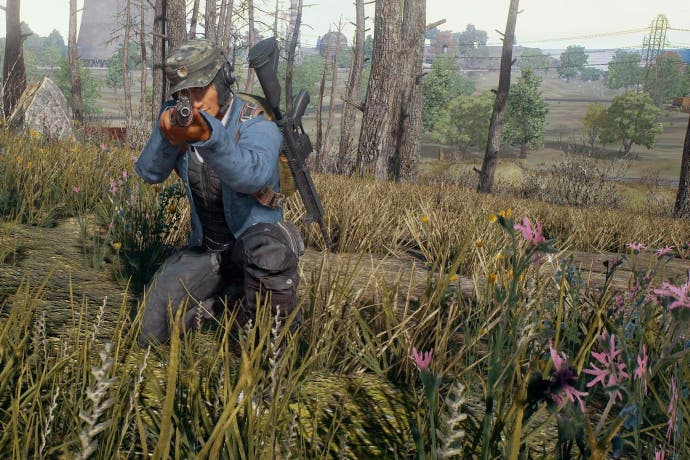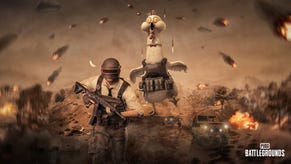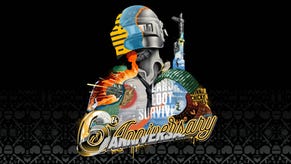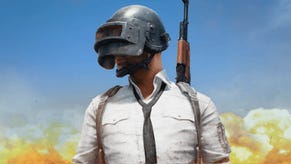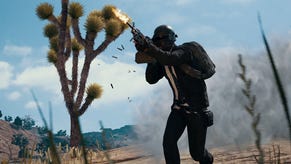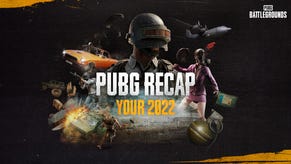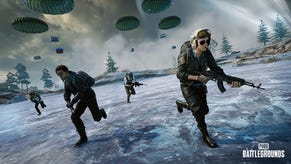What's behind PlayerUnknown's Battlegrounds' phenomenal success?
DayZ gone by.
Sometimes I wonder what the games industry would look like had Bohemia Interactive focussed on polishing and finishing their official version of DayZ, rather than vanishing down a rabbit-hole of granularity from which they never resurfaced. Imagine if players could experience its unique PvP of tense human encounters in a zombie-strewn wilderness, of fragile alliances and galling betrayals, without having to deal with a skipful of clunk and half-baked features for almost four years.
Sadly, we don't live in that universe. Instead we live in an alternate timeline where the industry hivemind has decided we don't want compelling, emergent, player driven drama. Apparently all we want is gigantic deathmatches with a survivalist twist. Digital Hunger Games, Battle Royales with customisable combat trousers, Escape to the Country meets the Running Man.
PlayerUnknown's Battlegrounds is the latest in a spate of these games, which also include the delightfully titled "The Culling", and H1Z1's "King of the Kill" (atrocious naming convention seems to be a running theme with this genre). Its design philosophy is to take the basic framework of DayZ, dress it in a smarter suit, and then cut out its heart and eat it. It has become an astonishing success, and I'm still trying to figure out why.
A game of Battlegrounds begins by parachuting 100 players onto a large island that blends rolling fields and deciduous forests with tumbledown towns and crumbling infrastructural compounds. Players must then scavenge weapons, vehicles and clothing, while fighting and evading other players as everyone competes to be the last person standing.
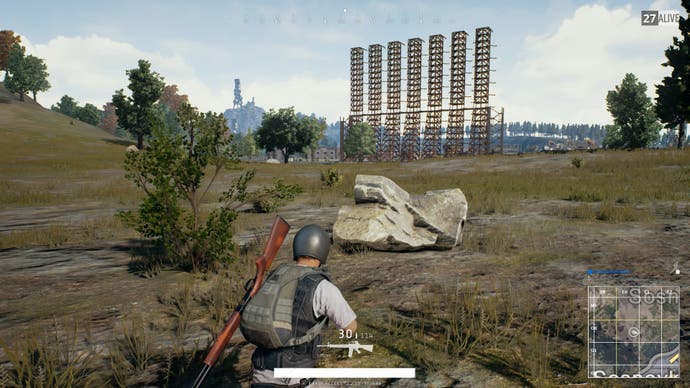
Unlike DayZ, where you are free to roam the landscape as you please, Battlegrounds keeps players on their toes by entrapping them within a deadly electrical force-field. What's more, this field shrinks as the game progresses. Getting caught in this field means certain death, so you need to constantly push toward the centre of the circle to survive. Yet dashing recklessly through the landscape will result in another player ventilating your skull from a distant hilltop, while you need to prepare to face the toughest and most heavily armed survivors should you make it to the final ten.
That balance between moving slow enough to stay hidden, but fast enough to remain unfried, is central to the game's tension, as is the fact that you choose when to parachute out of the plane that deposits players on the island. You could get lucky and land near the centre of the play area with no other survivors nearby. More often, though, you'll land some distance away from the safe zone and need to hustle to save your skin. You can also see nearby player's parachutes as they descend to the ground, resulting in a neat little minigame in trying to find a spot that's safely away from other survivors.
Battlegrounds trims a lot of the fat from other, similar games. There's no hunger or thirst or fatigue to worry about, no chance of getting sick or suffering a broken ear or punctured spleen as with some of the more depth-obsessed games on offer, (such things may be added later, of course). Instead, staying alive is all about outfitting yourself with the most trip-hop arsenal you can collect, and boosting your chances of surviving injury by tracking down armour and basic healing aids. These items are liberally spread through buildings. In most matches I was fully equipped within exploring a half-dozen houses. It's as if the NRA absconded to build an island Utopia and then shot each other all to death, leaving behind a hoard of armaments. Adding further evidence to this, weapons are highly customisable, with various types of scope, sight, foregrip and magazine available.
There's very little downtime in Battlegrounds. While actual combat is infrequent, the threat of fighting constantly looms large. In fact, one of Battlegrounds' best features is its ballistic sound design. Your survival plays out to the constant backing track of distant gunfire, which echoes across the landscape's undulating hills and perilously sparse fields. When those unseen sights are trained on you, the game shifts from tense to terrifying. It's supremely difficult to pin down a sniper by the sound of their fire. This also makes being the sniper an immense amount of fun, as you watch your poor victim panic helplessly within your sights.
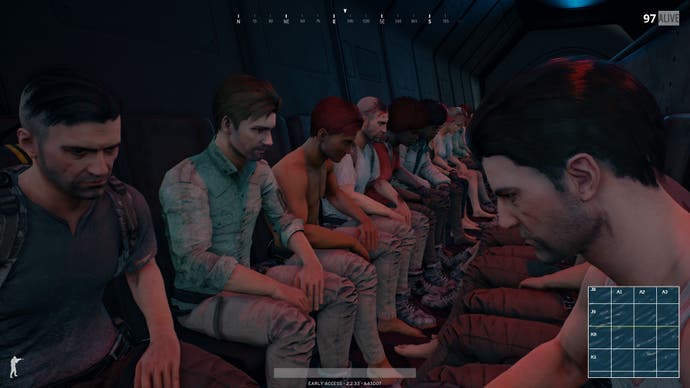
It's worth noting that Battleground's production values are generally decent, which is possibly one of the keys to its success. Even at this early stage, Battlegrounds is far less glitchy or clunky than DayZ or H1Z1. What's more, the game is much lighter and more responsive than either of those offerings, while the weapons feel more powerful and manoeuvrable. Inventory management is fairly straightforward too, listing your collected items on the left of the screen, and showing your outfit and weapon slots on the right.
Even when the guns are silenced, time and space are still against you, as you're constantly squeezed into a smaller, more dangerous combat area. As well as keeping the atmosphere at guy-wire levels of tension, it also produces some intriguing dilemmas. For example, in one game I arrived at the shore of a wide river. The safe zone was on the far side, and the only crossing was a long road-bridge straddling the horizon. I reckoned I could make it to the bridge in time, but there was a strong chance I'd be walking into a trap. Alternatively, I could swim across the river. I'd be able to stay hidden underwater for at least some of the crossing, but it would leave me completely defenceless if I was spotted.
In the end, I opted for the river, and it proved to be the right decision. Another player who tried this tactic wasn't so lucky, however, as I spotted him emerging from the water ahead of me, and shot him in the back as soon as I could stand.
Battlegrounds achieves what it sets out to do competently enough. The reason I find its level of success bewildering is because it is phenomenally bland. Its island landscape resembles a budget knock-off of DayZ's Chernarus, right down to the Czech-sounding place names. There's no distinct theme to its free-for-all killathon. You've got modern military hardware sitting alongside futuristic electricity domes in a vaguely soviet-era eastern-bloc environment. It reminds me of those dodgy pound shop action figures that have Batman's torso and Spider-man's legs. Battlegrounds offers neither the coherent dystopia of The Hunger Games, nor the savage political commentary of Battle Royale. Not that I expect it to be satirical or contemplative in a meaningful way, but a little bit of cohesion or style would be nice.
A bigger problem is there's currently no way for the game to produce more interesting, player-driven scenarios beyond combat skirmishes. It is possible to team up with friends in duos or groups, but these groups are bound by the rules of the game. It's not possible to form and break temporary alliances during play, and even if it was, currently there's no real incentive to do so.
The result is Battlegrounds misses out on one of the most important elements of the Battle Royale concept, those ever-shifting allegiances between groups of people, and the emotions that bind and shatter them; desperation, betrayal, loyalty, sacrifice. These are what make DayZ interesting, even if it does handle like a bin-lorry on a beach. You might say "It isn't trying to be like DayZ!" and that's true. But it is trying to be like Battle Royale, and these elements are crucial to its success as a film. Battlegrounds is just mindless killing, only at a slower pace than something like Call of Duty.
I think ultimately, the reason why Battlegrounds has proved so popular is that it bothers to do the basic groundwork first. It's intuitive to play, feels decent beneath the fingers, and you don't need hours of experience with it to do well. But at the moment, all of that comes at the price of a certain spark.
